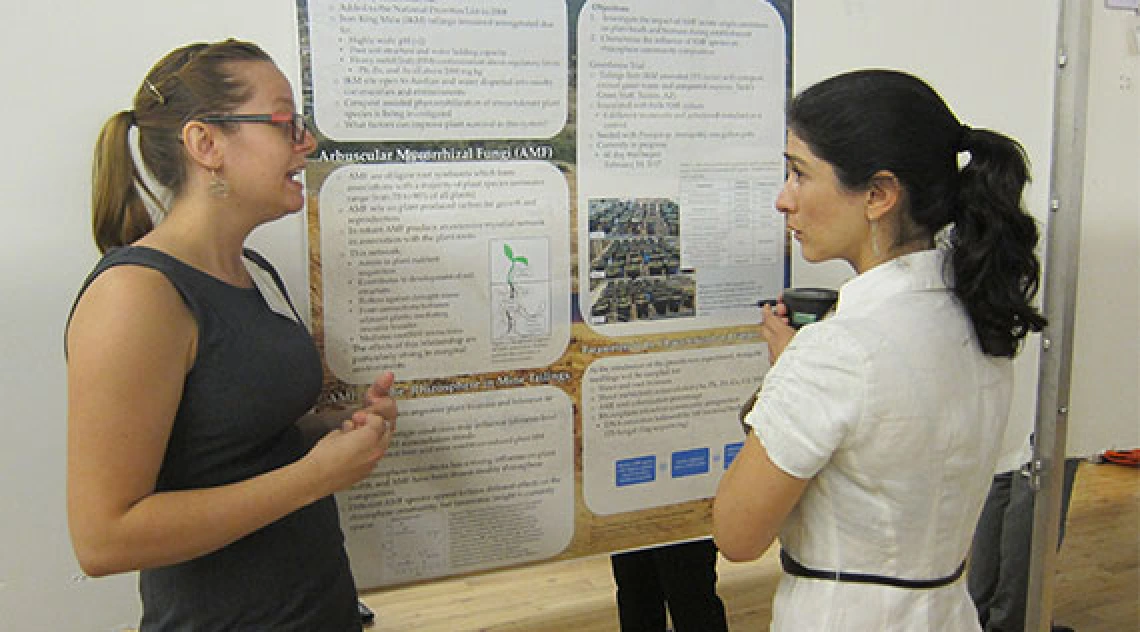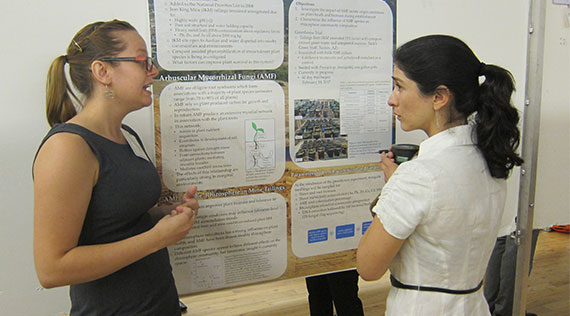UA SRP Trainees share their work at Earth Day SWESx 2018

As part of the 2018 Earth Day festivities, the University of Arizona Department of Soil, Water, and Environmental Science (SWES) organized its annual SWESx event, a showcase of research by undergraduate and graduate students. This year the event was held April 12 and UA SRP graduate and undergraduate trainees were well represented:
 Kimberly Danny (MS Graduate Student mentored by UA SRP principal investigators Karletta Chief and Mark Brusseau) presented a poster on mining educational modules for impacted tribal communities on how to bring the focus back to the communities. Danny highlighted how the UA SRP collaborated with two Arizona tribal colleges to prepare educational modules on fundamental mining concepts for Native American audiences. “The history of tribe and natural resource extraction, it’s generally pretty negative,” Danny said. “But for any tribes currently mining or planning to mine in the future, this education is very important.”
Kimberly Danny (MS Graduate Student mentored by UA SRP principal investigators Karletta Chief and Mark Brusseau) presented a poster on mining educational modules for impacted tribal communities on how to bring the focus back to the communities. Danny highlighted how the UA SRP collaborated with two Arizona tribal colleges to prepare educational modules on fundamental mining concepts for Native American audiences. “The history of tribe and natural resource extraction, it’s generally pretty negative,” Danny said. “But for any tribes currently mining or planning to mine in the future, this education is very important.”
 Emalee Eisenhauer (MS Graduate student mentored by UA SRP director Raina Maier) won 3rd place for her poster on how soil fungus communities are vital to the healthy growth of plants, particularly on Superfund sites that have mine tailings. “It’s so important to communicate our research to the public, especially with work like the UA SRP’s,” Eisenhauer said. “Any opportunity we have for outreach is good.”
Emalee Eisenhauer (MS Graduate student mentored by UA SRP director Raina Maier) won 3rd place for her poster on how soil fungus communities are vital to the healthy growth of plants, particularly on Superfund sites that have mine tailings. “It’s so important to communicate our research to the public, especially with work like the UA SRP’s,” Eisenhauer said. “Any opportunity we have for outreach is good.”
Hanna Hard (MS Graduate Student mentored by Monica Ramirez-Andreotta) won 2nd place for her oral presentation: “Assessing the Feasibility of Using a Sealed Landfill for Agricultural Graze Land”.
Lydia Jennings (PhD Graduate Student mentored by Raina Maier) gave an oral presentation entitled: Developing Microbial Bio-indicators of Soil Formation on Reclaimed Mine Tailings in Southern Arizona.
 Denise Moreno Ramírez (PhD Candidate mentored by Raina Maier and Monica Ramirez-Andreotta) won 2nd place for her poster on the “Voices Unheard” project, which aims to preserve the life stories of people working and living near Superfund sites in Arizona using oral histories, as these important stories often are never recorded. When asked about the importance of science communication Moreno Ramírez said, “It’s important because the paradigm of why we’re doing science is changing. Environmental justice communities have been advocating to switch the agenda to have real world problems answered, not just research for the sake of research.”
Denise Moreno Ramírez (PhD Candidate mentored by Raina Maier and Monica Ramirez-Andreotta) won 2nd place for her poster on the “Voices Unheard” project, which aims to preserve the life stories of people working and living near Superfund sites in Arizona using oral histories, as these important stories often are never recorded. When asked about the importance of science communication Moreno Ramírez said, “It’s important because the paradigm of why we’re doing science is changing. Environmental justice communities have been advocating to switch the agenda to have real world problems answered, not just research for the sake of research.”
Lia Ossanna (Undergraduate student mentored by Raina Maier) won 1st place for her oral presentation about biogeochemical indicators of soil quality and how to measure revegetation progress on mining waste rock using total nitrogen and biomass content.
Karen Serrano (Undergraduate student mentored by Raina Maier) won 3rd place for her poster entitled “Revegetation of Mine Waste Rock Slopes: Influence of pH and Bioavailable Phosphorus”. This was Karen’s first time participating in SWESx and she enjoyed the opportunity to talk about her research, to network, and to participate in the diverse work in the SWES Department.
Congratulations to all our Superfund trainees!

